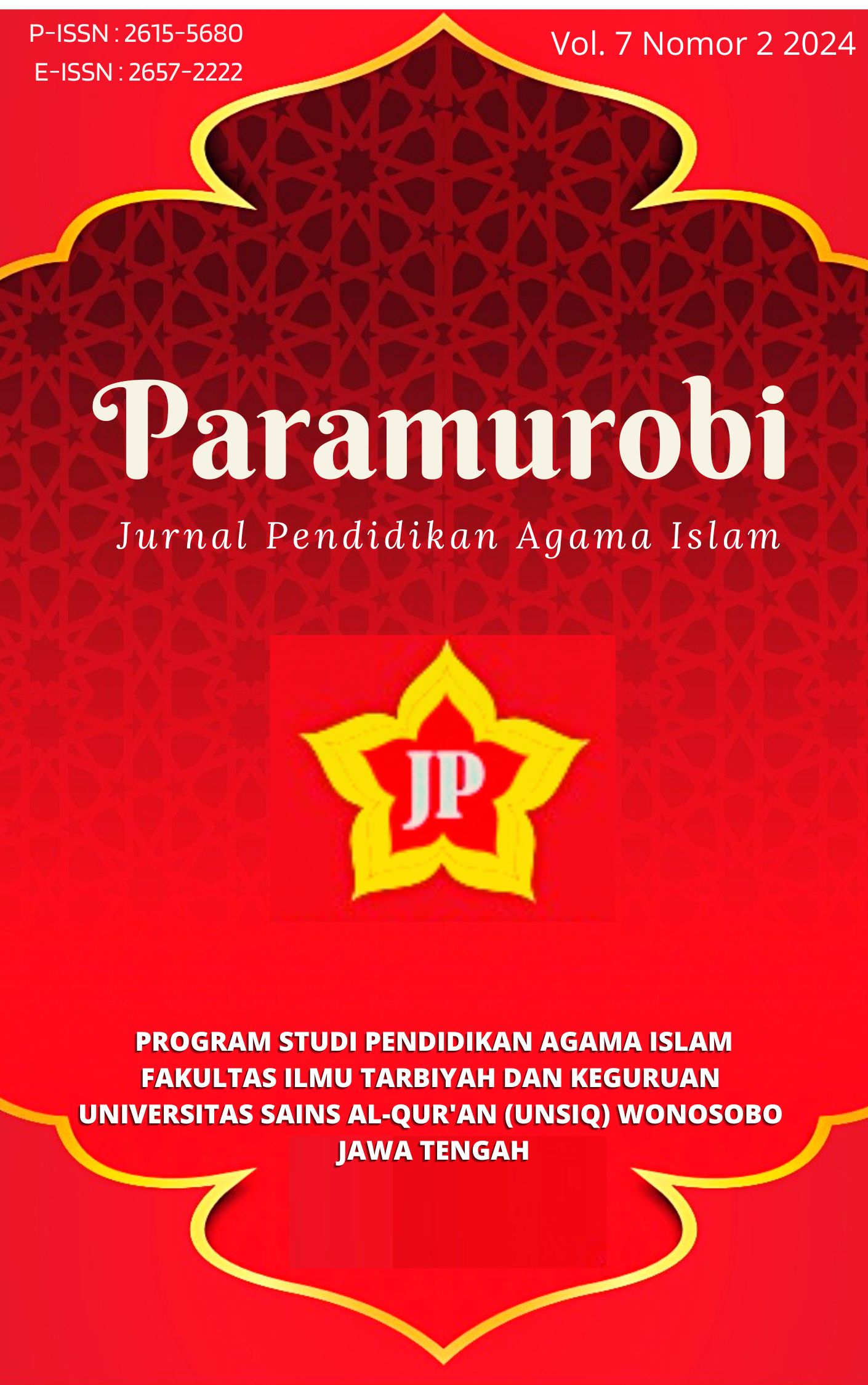IMPLEMENTASI NILAI-NILAI PANCA JIWA PONDOK MODERN DAN KONTRIBUSINYA DALAM PEMBENTUKAN KEMANDIRIAN USAHA PRODUKTIF SANTRI
DOI:
https://doi.org/10.32699/paramurobi.v7i2.7268Keywords:
Panca Jiwa, Modern Boarding School, Independence, Productive EconomyAbstract
Islamic boarding school is an Islamic educational institution with a dormitory system, which is considered to have a conducive learning environment to shape the character and application of Islamic teaching values to students in their daily lives. One of the values applied in Islamic boarding schools is the five souls, namely the spirit of the boarding school which is the foundation and guide for behavior. However, with the rapid development of the times and science and technology, many problems and errors in thinking patterns have emerged regarding the education provided by Islamic boarding schools, including the Al-Hasyimiyah Modern Islamic Boarding School. Therefore, this research aims to analyze in more depth the implementation of the five soul values of modern Islamic boarding schools to shape the character of the students of Al-Hasyimiyah modern Islamic boarding school. In its implementation, the researcher used a qualitative case study type method, which used primary data sources obtained from participant observation, interviews and documentation. The results of the study show that the five souls implemented by the Al-Hasyimiyah Modern Islamic Boarding School are sincerity, simplicity, independence, Islamic brotherhood, and freedom. The implementation of the five souls of modern Islamic boarding school is to form the independence of the students' productive economic efforts of class 6 KMI students at the Al-Hasyimiyah Modern Islamic Boarding School through daily activities at the Islamic boarding school and the example of the religious teachers. These activities are actualized in the form of daily to annual activity programs.
References
Benazir. “Pemberdayaan Usaha Ekonomi Produktif (UEP) Terhadap Peningkatan Pendapatan Pengajar Pada Pesantren Di Kabupaten Bireuen.” Jurnal HEI EMA 1, no. 1 (2022): 75–85.
Hadari, Halimah Basri, and Achmad Abubakar. “Ukhuwah Dalam Al-Qur ’ an (Studi Tafsir Tematik).” Tafsere 11, no. 1 (2023): 20–35.
Hamsir, Khojir, and Shafa. “Pertumbuhan Karakter Panca Jiwa Santri Melalui Metode Targhib Wa Tarhib Di Pondok Pesantren Daarl Ukhuwah As’adiyah Kabupaten Kutai Kartanegara.” JIP: Jurnal Inspiratif Pendidikan XII, no. 2 (2023): 307–335.
Ismail, Shalahudin, Mamun Zahrudin, Nurwadjah Ahmad, and Andewi Suhartini. “Pembentukan Karakter Santri Melalui Panca Jiwa Pondok Pesantren.” Dirasat: Jurnal Manajemen Dan Pendidikan Islam 6, no. 2 (2020): 132–143.
Junaidi, R. A. A., Bahaking Rama, and Muhammad Yahdi. “Lembaga Pendidikan Pesantren Di Indonesia: Islamic Boarding School Education Institutions in Indonesia.” Iqra: Jurnal Ilmu Kependidikan Dan Keislaman 18, no. 2 (2023): 101–107.
Khalurrahman, Mohammad, Fatma Kurniasih, Didit Hidayatullah, Uswatun Roikhanah, M Ikhsan, Nurul Huda, Arda Deva Agustian, et al. Ensiklopedi Mufassir Al-Qur’an Indonesia. Cetakan I. Yogyakarta: Idea Press, 2022.
Latipah, Neng. “Peran Pondok Pesantren Dalam Meningkatkan Kemandirian Santri Di Pondok Pesantren Nurrohman Al-Burhany Purwakarta.” Jurnal Comm-Edu 2, no. 3 (2019): 193–201.
Maksum, Muh. Nur Rochim, Bobby Hadi P, Ismail Lutfiriyanto, and Deddy Ramdhani. “Implementasi Panca Jiwa Pondok Dalam Pembentukan Karakter Santri Di Pondok Pesantren Ta’Mirul Islam Sragen.” Iseedu: Journal of Islamic Educational Thoughts and Practices, 2021.
Muhtarom, Ali, Sahlul Fuad, and Tsabit Latief. Moderasi Beragama: Konsep, Nilai Dan Strategi Pengembangannya Di Pesantren. Cetakan I. Jakarta Selatan: Yayasan Talibuana Nusantara, 2020.
Nurhamzah, and Rusdiana A. Ilmu Akhlak. Bandung: UIN Sunan Gunung Djati, 2020.
Nurul Romdoni, Lisda, and Elly Malihah. “Membangun Pendidikan Karakter Santri Melalui Panca Jiwa Pondok Pesantren.” Jurnal Pendidikan Agama Islam Al-Thariqah 5, no. 2 (2020): 13–22.
Radhiyah, Sitti, and Husnul Fahimah Ilyas. “Model Pemberdayaan Usaha Ekonomi Santri Di Pesantren.” Educandum 8, no. 1 (2022).
Rahmawati, Rukhaini Fitri. “Pendidikan Moderasi Beragama Di Lembaga Pesantren Modern.” In Proceeding 2th NCESCO: National Conference on Educational Science and Counseling, 147–156. Kudus: IAIN Kudus, 2022.
Rambe, Posman, Sabaruddin, and Maryam. “Model Moderasi Beragama Berbasis Pesantren Salaf: Studi Kasus Pada Madrasah Salafiyyah.” Jurnal Pendidikan Agama Islam Al-Thariqah 7, no. 1 (2022): 157–168.
Rusmiati, Elis Teti, M. A. Heryanto Alfudholli, Asep Shodiqin, and Taufiqurokhman. “Penguatan Moderasi Beragama Di Pesantren Untuk Mencegah Tumbuhnya Radikalisme.” ABDI MOESTOPO: Jurnal Pengabdian Pada Masyarakat 5, no. 2 (2022): 203–213.
Siregar, Jainal Abidin, Anhar, and Sholeh Fikri. “Penerapan Panca Jiwa Dalam Kehidupan Sehari- HariSantri Di Pesantren Ar-Raudlatul Hasanah Lumut Tapanuli Tengah Sematra Utara.” Jurnal Pendidikan Tambusai 7, no. 2 (2023): 1–23.
Subiantoro. K.H. Imam Zarkasyi: Pemikiran Sang Pelopor Pendidikan Islam Modern. Cetakan I. Yogyakarta: Trussmedia, 2021.
Sugiyono. Metode Penelitian Kuantitatif, Kualitatif, Dan R&D. Bandung: Alfabeta, 2019.
Sumanto. Peristiwa Dan Gejala Jiwa Pada Masyarakat Selama Masa Pandemi Corona-19. Yogyakarta: Penerbit Andi, 2022.
Tabroni, Imam, Septian Pajar, Ahmad Raffi Maulana, and Lailatul Jalilah. “Peran Pesantren Modern Dalam Pengembangan Keterampilan Menjadi Generasi Bertalenta.” Journal of Social Work and Empowerment 2, no. 2 SE- (2023): 87–92.
Taufiqurrahman. “Ikhlas Dalam Perspektif Alquran.” Eduprof : Islamic Education Journal 1, no. 2 (2019): 94–118.
Downloads
Published
Issue
Section
License
Copyright Notice
1. Authors retain copyright and grant the journal right of first publication with the work simultaneously licensed under a Creative Commons Attribution License (CC BY-SA 4.0) that allows others to share (copy and redistribute the material in any medium or format), and adapt (remix, transform, and build upon the material) the work for any purpose, even commercially with an acknowledgement of the work's authorship and initial publication in this journal.
2. Authors are able to enter into separate, additional contractual arrangements for the non-exclusive distribution of the journal's published version of the work (e.g., post it to an institutional repository or publish it in a book), with an acknowledgement of its initial publication in this journal.
3. Authors are permitted and encouraged to post their work online (e.g., in institutional repositories or on their website) prior to and during the submission process, as it can lead to productive exchanges, as well as earlier and greater citation of published work (See The Effect of Open Access).





